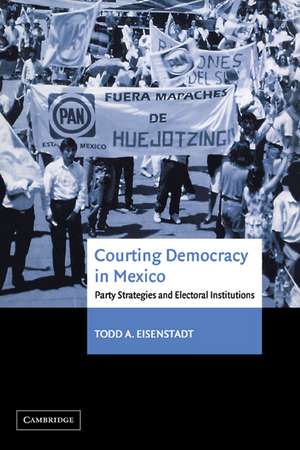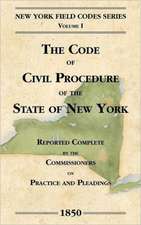Courting Democracy in Mexico: Party Strategies and Electoral Institutions
Autor Todd A. Eisenstadten Limba Engleză Paperback – 25 mar 2007
| Toate formatele și edițiile | Preț | Express |
|---|---|---|
| Paperback (1) | 323.27 lei 6-8 săpt. | |
| Cambridge University Press – 25 mar 2007 | 323.27 lei 6-8 săpt. | |
| Hardback (1) | 785.97 lei 6-8 săpt. | |
| Cambridge University Press – 23 noi 2003 | 785.97 lei 6-8 săpt. |
Preț: 323.27 lei
Nou
Puncte Express: 485
Preț estimativ în valută:
61.86€ • 63.91$ • 51.46£
61.86€ • 63.91$ • 51.46£
Carte tipărită la comandă
Livrare economică 20 martie-03 aprilie
Preluare comenzi: 021 569.72.76
Specificații
ISBN-13: 9780521035880
ISBN-10: 0521035880
Pagini: 376
Ilustrații: 14 tables
Dimensiuni: 150 x 228 x 22 mm
Greutate: 0.55 kg
Editura: Cambridge University Press
Colecția Cambridge University Press
Locul publicării:Cambridge, United Kingdom
ISBN-10: 0521035880
Pagini: 376
Ilustrații: 14 tables
Dimensiuni: 150 x 228 x 22 mm
Greutate: 0.55 kg
Editura: Cambridge University Press
Colecția Cambridge University Press
Locul publicării:Cambridge, United Kingdom
Cuprins
Figures and tables; Acknowledgements; 1. Electoral courts and actor compliance: opposition-authoritarian relations and protracted transitions; 2. Ties that bind and even constrict: why authoritarians tolerate electoral reforms; 3. Mexico's national electoral justice success: from oxymoron to legal norm in just over a decade; 4. Mexico's local electoral justice failures: gubernatorial (s)election beyond the shadows of the law; 5. The gap between law and practice: institutional failure and opposition success in postelectoral conflicts, 1989–2000; 6. The National Action Party: dilemmas of rightist oppositions defined by authoritarian collusion; 7. The party of the democratic revolution: from postelectoral movements to electoral competitors; 8. Dedazo from the center to finger pointing from the periphery: PRI hard-liners challenge Mexico's electoral institutions; 9. A quarter century of 'Mexicanization': lessons from a protracted transition; Appendices; Bibliography; Index.
Recenzii
"...a detailed and thorough account of the gradual transition to democracy in Mexico that focuses on the roles played by the two main opposition parties...provides a wealth of data...makes important contributions to our understanding of the complex and varied conditions under which democracy can be implemented, especially in his discussion of the interplay between formal and informal institutions." M.T. Kenney, Austin Peay State University, Choice
"Eisenstadt's book is a remarkably detailed and comprehensive analysis of Mexico's "protracted" move away from a single-party authoritarian system." Latin American Politics and Society, Emily Edmonds-Poli, University of San Diego
"Meticulously researched and theoretically rich, Eisenstadt's book provides the most extensive account we are likely to see of the interaction between national-level elites--from both regime and opposition--and party activists at the state and local levels as the opposition parties began to seriously contest elections in the late 1980s and 1990s." Political Science Quarterly, Joseph L. Klesner, Kenyon College
"Eisenstadt's book is a remarkably detailed and comprehensive analysis of Mexico's "protracted" move away from a single-party authoritarian system." Latin American Politics and Society, Emily Edmonds-Poli, University of San Diego
"Meticulously researched and theoretically rich, Eisenstadt's book provides the most extensive account we are likely to see of the interaction between national-level elites--from both regime and opposition--and party activists at the state and local levels as the opposition parties began to seriously contest elections in the late 1980s and 1990s." Political Science Quarterly, Joseph L. Klesner, Kenyon College
Descriere
This book is a most comprehensive explanation of Mexico's gradual transition to democracy.















